旅游英语
- 格式:doc
- 大小:84.50 KB
- 文档页数:12
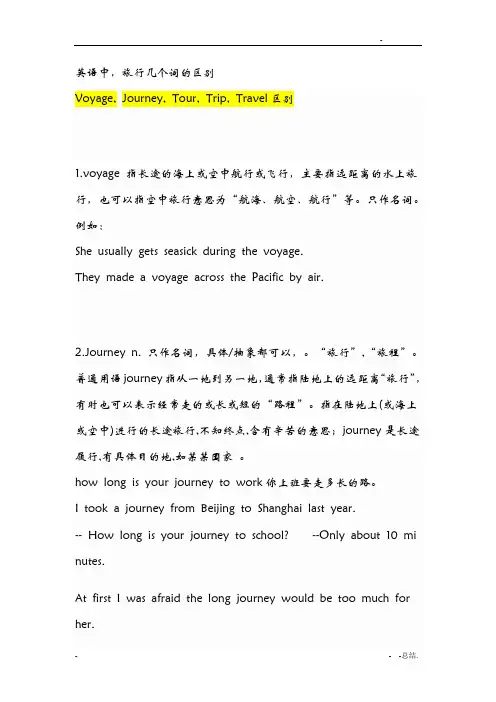
英语中,旅行几个词的区别Voyage, Journey, Tour, Trip, Travel区别1.voyage 指长途的海上或空中航行或飞行,主要指远距离的水上旅行,也可以指空中旅行意思为“航海、航空、航行”等。
只作名词。
例如:She usually gets seasick during the voyage.They made a voyage across the Pacific by air.2.Journey n. 只作名词,具体/抽象都可以,。
“旅行”,“旅程”。
普通用语journey指从一地到另一地,通常指陆地上的远距离“旅行”,有时也可以表示经常走的或长或短的“路程”。
指在陆地上(或海上或空中)进行的长途旅行,不知终点,含有辛苦的意思;journey是长途履行,有具体目的地,如某某国家。
how long is your journey to work你上班要走多长的路。
I took a journey from Beijing to Shanghai last year.-- How long is your journey to school?--Only about 10 mi nutes.At first I was afraid the long journey would be too much for her.起初我担心她不能行这样远的路。
I wish you a good journey.祝你一路平安。
3.tour n. “周游”。
指途中在许多地方作短暂停留的观光游览。
to ur是指为游玩而到几个地方观光的(长途或短途)旅行,而且是跟团. tour也是长途,但没有目的地,比如西方国家,欧洲之类.tour 着重指旅行线路比较曲折,常表示“(周游各地的)参观、访问、(巡回)旅游、视察、购物、演出”等意思。
可作动词和名词。
指途中作短期逗留的巡回旅行,强调游览多处,常用来指观光等;例如:I will tour the world in the future.My father has gone down-town on a shopping tour.We went on a guided tour of Italy that included stops at Mila n, Venice, Florence and Rome.我们在导游的带领下游览了意大利,包括米兰,威尼斯,佛罗伦萨和罗马。
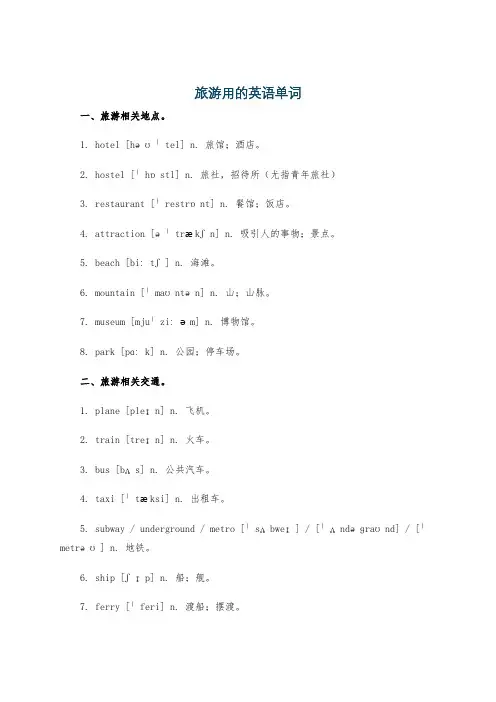
旅游用的英语单词一、旅游相关地点。
1. hotel [həʊˈtel] n. 旅馆;酒店。
2. hostel [ˈhɒstl] n. 旅社,招待所(尤指青年旅社)3. restaurant [ˈrestrɒnt] n. 餐馆;饭店。
4. attraction [əˈtrækʃn] n. 吸引人的事物;景点。
5. beach [biːtʃ] n. 海滩。
6. mountain [ˈmaʊntən] n. 山;山脉。
7. museum [mjuˈziːəm] n. 博物馆。
8. park [pɑːk] n. 公园;停车场。
二、旅游相关交通。
1. plane [pleɪn] n. 飞机。
2. train [treɪn] n. 火车。
3. bus [bʌs] n. 公共汽车。
4. taxi [ˈtæksi] n. 出租车。
5. subway / underground / metro [ˈsʌbweɪ] / [ˈʌndəɡraʊnd] / [ˈmetrəʊ] n. 地铁。
6. ship [ʃɪp] n. 船;舰。
7. ferry [ˈferi] n. 渡船;摆渡。
三、旅游相关人物与服务。
1. guide [ɡaɪd] n. 导游;指南 vt. 引导;带领。
2. tourist [ˈtʊərɪst] n. 旅行者,观光客。
3. travel agent [ˈtrævl ˈeɪdʒənt] 旅行代理人(n. 短语)4. receptionist [rɪˈsepʃənɪst] n. 接待员。
5. check - in [ˈtʃek ɪn] n. (旅馆、机场等)登记入住;报到。
6. check - out [ˈtʃek aʊt] n. 结账离开;检验;合格。
四、旅游相关活动与感受。
1. sightseeing [ˈsaɪtsiːɪŋ] n. 观光;游览。
2. hiking [ˈhaɪkɪŋ] n. 徒步旅行。
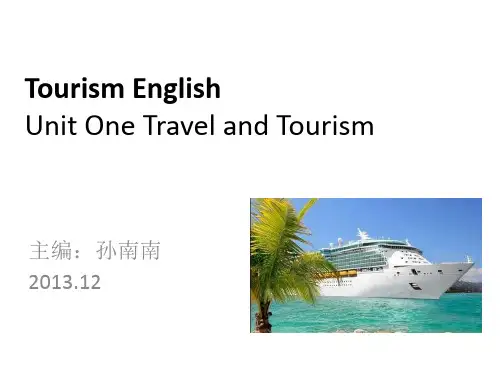
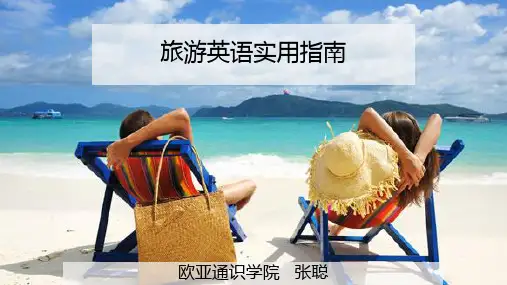
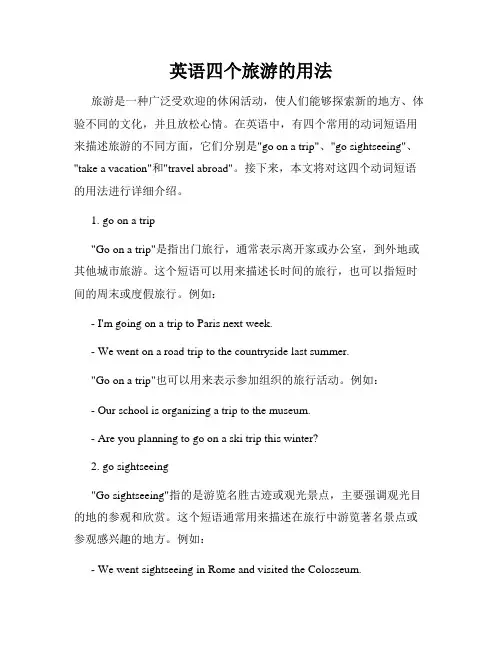
英语四个旅游的用法旅游是一种广泛受欢迎的休闲活动,使人们能够探索新的地方、体验不同的文化,并且放松心情。
在英语中,有四个常用的动词短语用来描述旅游的不同方面,它们分别是"go on a trip"、"go sightseeing"、"take a vacation"和"travel abroad"。
接下来,本文将对这四个动词短语的用法进行详细介绍。
1. go on a trip"Go on a trip"是指出门旅行,通常表示离开家或办公室,到外地或其他城市旅游。
这个短语可以用来描述长时间的旅行,也可以指短时间的周末或度假旅行。
例如:- I'm going on a trip to Paris next week.- We went on a road trip to the countryside last summer."Go on a trip"也可以用来表示参加组织的旅行活动。
例如:- Our school is organizing a trip to the museum.- Are you planning to go on a ski trip this winter?2. go sightseeing"Go sightseeing"指的是游览名胜古迹或观光景点,主要强调观光目的地的参观和欣赏。
这个短语通常用来描述在旅行中游览著名景点或参观感兴趣的地方。
例如:- We went sightseeing in Rome and visited the Colosseum.- When you visit New York City, don't miss the opportunity to go sightseeing in Central Park."Go sightseeing"还可以用来表示参观城市的文化和历史名胜。
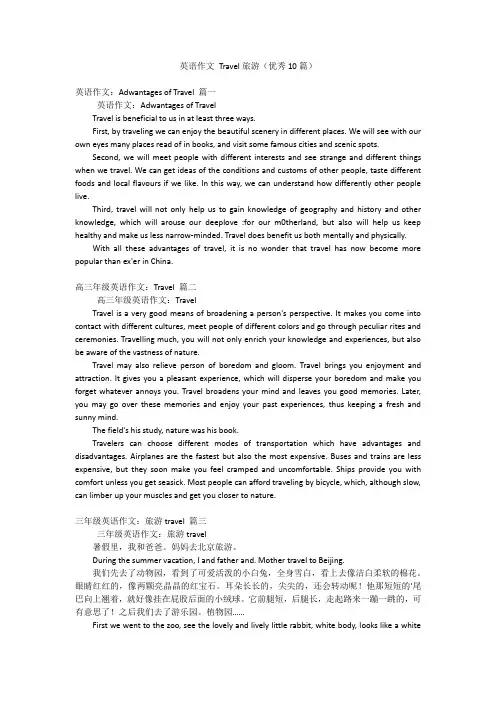
英语作文Travel旅游(优秀10篇)英语作文:Adwantages of Travel 篇一英语作文:Adwantages of TravelTravel is beneficial to us in at least three ways.First, by traveling we can enjoy the beautiful scenery in different places. We will see with our own eyes many places read of in books, and visit some famous cities and scenic spots.Second, we will meet people with different interests and see strange and different things when we travel. We can get ideas of the conditions and customs of other people, taste different foods and local flavours if we like. In this way, we can understand how differently other people live.Third, travel will not only help us to gain knowledge of geography and history and other knowledge, which will arouse our deeplove :for our m0therland, but also will help us keep healthy and make us less narrow-minded. Travel does benefit us both mentally and physically.With all these advantages of travel, it is no wonder that travel has now become more popular than ex'er in China.高三年级英语作文:Travel 篇二高三年级英语作文:TravelTravel is a very good means of broadening a person's perspective. It makes you come into contact with different cultures, meet people of different colors and go through peculiar rites and ceremonies. Travelling much, you will not only enrich your knowledge and experiences, but also be aware of the vastness of nature.Travel may also relieve person of boredom and gloom. Travel brings you enjoyment and attraction. It gives you a pleasant experience, which will disperse your boredom and make you forget whatever annoys you. Travel broadens your mind and leaves you good memories. Later, you may go over these memories and enjoy your past experiences, thus keeping a fresh and sunny mind.The field's his study, nature was his book.Travelers can choose different modes of transportation which have advantages and disadvantages. Airplanes are the fastest but also the most expensive. Buses and trains are less expensive, but they soon make you feel cramped and uncomfortable. Ships provide you with comfort unless you get seasick. Most people can afford traveling by bicycle, which, although slow, can limber up your muscles and get you closer to nature.三年级英语作文:旅游travel 篇三三年级英语作文:旅游travel暑假里,我和爸爸。
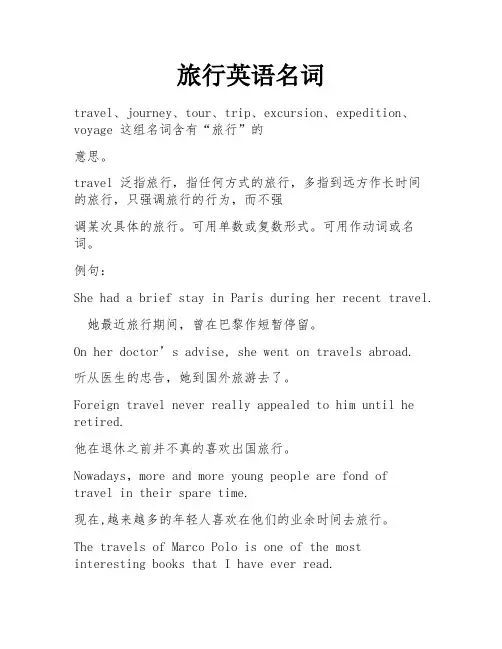
旅行英语名词travel、journey、tour、trip、excursion、expedition、voyage 这组名词含有“旅行”的意思。
travel 泛指旅行,指任何方式的旅行,多指到远方作长时间的旅行,只强调旅行的行为,而不强调某次具体的旅行。
可用单数或复数形式。
可用作动词或名词。
例句:She had a brief stay in Paris during her recent travel.她最近旅行期间,曾在巴黎作短暂停留。
On her doctor’s advise, she went on travels abroad.听从医生的忠告,她到国外旅游去了。
Foreign travel never really appealed to him until he retired.他在退休之前并不真的喜欢出国旅行。
Nowadays,more and more young people are fond oftravel in their spare time.现在,越来越多的年轻人喜欢在他们的业余时间去旅行。
The travels of Marco Polo is one of the mostinteresting books that I have ever read.马可波罗的游记是我生平读过的最有意思的一本书。
Many businesses have found that such holiday travel incentives are very successful.许多企业发现这样的假日旅行奖励是非常成功的。
——————Joe recently traveled to Australia on business. (用作动词)乔最近到澳大利亚出差。
He wished to travel all around the world so that he could study the customs ofdifferent countries.他希望去旅游以研究不同国家的民俗风情。

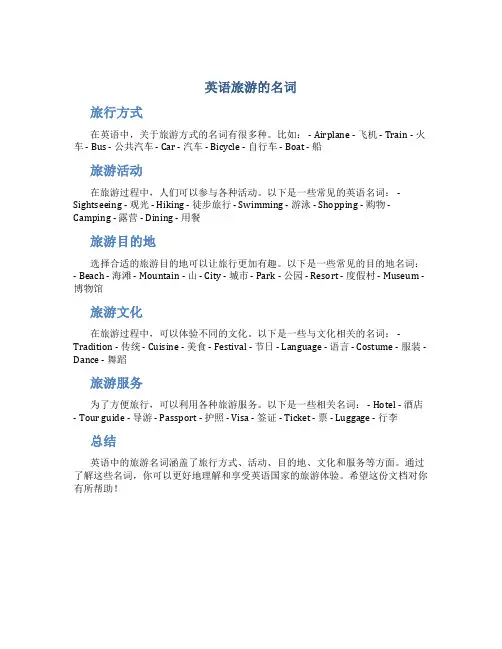
英语旅游的名词
旅行方式
在英语中,关于旅游方式的名词有很多种。
比如: - Airplane - 飞机 - Train - 火车 - Bus - 公共汽车 - Car - 汽车 - Bicycle - 自行车 - Boat - 船
旅游活动
在旅游过程中,人们可以参与各种活动。
以下是一些常见的英语名词: - Sightseeing - 观光 - Hiking - 徒步旅行 - Swimming - 游泳 - Shopping - 购物 - Camping - 露营 - Dining - 用餐
旅游目的地
选择合适的旅游目的地可以让旅行更加有趣。
以下是一些常见的目的地名词:- Beach - 海滩 - Mountain - 山 - City - 城市 - Park - 公园 - Resort - 度假村 - Museum - 博物馆
旅游文化
在旅游过程中,可以体验不同的文化。
以下是一些与文化相关的名词: - Tradition - 传统 - Cuisine - 美食 - Festival - 节日 - Language - 语言 - Costume - 服装 - Dance - 舞蹈
旅游服务
为了方便旅行,可以利用各种旅游服务。
以下是一些相关名词: - Hotel - 酒店- Tour guide - 导游 - Passport - 护照 - Visa - 签证 - Ticket - 票 - Luggage - 行李总结
英语中的旅游名词涵盖了旅行方式、活动、目的地、文化和服务等方面。
通过了解这些名词,你可以更好地理解和享受英语国家的旅游体验。
希望这份文档对你有所帮助!。
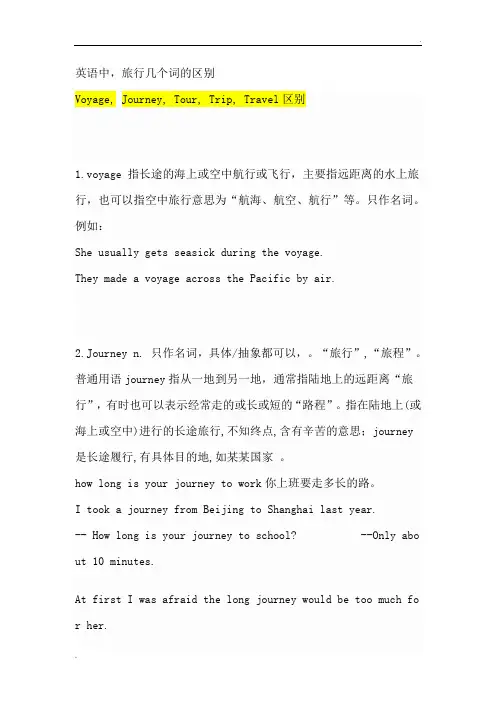
英语中,旅行几个词的区别Voyage, Journey, Tour, Trip, Travel区别1.voyage 指长途的海上或空中航行或飞行,主要指远距离的水上旅行,也可以指空中旅行意思为“航海、航空、航行”等。
只作名词。
例如:She usually gets seasick during the voyage.They made a voyage across the Pacific by air.2.Journey n. 只作名词,具体/抽象都可以,。
“旅行”,“旅程”。
普通用语journey指从一地到另一地,通常指陆地上的远距离“旅行”,有时也可以表示经常走的或长或短的“路程”。
指在陆地上(或海上或空中)进行的长途旅行,不知终点,含有辛苦的意思;journey是长途履行,有具体目的地,如某某国家。
how long is your journey to work你上班要走多长的路。
I took a journey from Beijing to Shanghai last year.-- How long is your journey to school? --Only abo ut 10 minutes.At first I was afraid the long journey would be too much fo r her.起初我担心她不能行这样远的路。
I wish you a good journey.祝你一路平安。
3.tour n. “周游”。
指途中在许多地方作短暂停留的观光游览。
t our是指为游玩而到几个地方观光的(长途或短途)旅行,而且是跟团. tour也是长途,但没有目的地,比如西方国家,欧洲之类.tour 着重指旅行线路比较曲折,常表示“(周游各地的)参观、访问、(巡回)旅游、视察、购物、演出”等意思。
可作动词和名词。
指途中作短期逗留的巡回旅行,强调游览多处,常用来指观光等;例如:I will tour the world in the future.My father has gone down-town on a shopping tour.We went on a guided tour of Italy that included stops at Mi lan, Venice, Florence and Rome.我们在导游的带领下游览了意大利, 包括米兰,威尼斯,佛罗伦萨和罗马。
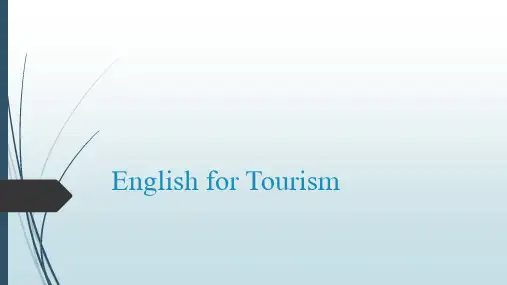
Unit1 What is Tourism?When we think of tourism; we think primarily of people who are visiting a particular place for sightseeing, visiting friends and relatives, taking a vacation, and having a good time. They may spend their leisure time engaging in various sports, sunbathing, talking, singing, taking rides, touring, reading, or simply enjoying the environment. If we consider the subject further, we may include in our definition of tourism people who are participating in a convention, a business conference, or some other kind of business or professional activity, as well as those who are taking a study tour under an expert guide or doing some kind of scientific research or study.These visitors use all forms of transportation, from hiking in a wilderness park to flying in a jet to an exciting city. Transportation can include taking a chairlift up a Colorado mountainside or standing at the rail of a cruise ship looking across the blue Caribbean. Whether people travel by one of these means or by car, motorcoach, camper, train, taxi, motorbike, or bicycle, they are taking a trip and thus are engaging in tourism.Any attempt to define tourism and to describe its scope fully must consider the various groups that participate in and are affected by this industry. Their perspectives are vital to the development of a comprehensive definition. Four different perspectives of tourism can be identified:1. The tourist. The tourist seeks various psychic and physical experiences and satisfactions. The nature of these will largely determine the destinations chosen and the activities enjoyed.2. The businesses providing tourist goods and services. Business people see tourism as an opportunity to make a profit by supplying the goods and services that the tourist market demands.3. The government of the host community or area. Politicians view tourism as a wealth factor in the economy of their jurisdictions. Their perspective is related to the incomes their citizens can earn from this business. Politicians also consider the foreign exchange receipts from international tourism as well as the tax receipts collected from tourist expenditures, either directly or indirectly.4. The host community. Local people usually see tourism as a cultural and employment factor. Of importance to their group, for example, is the effect of the interaction between large numbers of international visitors and residents. This effect ma be beneficial of harmful, or both.Thus, tourism may be defined as the sum of the phenomena and relationships arising from the interaction of tourists, business suppliers, host governments, and host communities in the process of attracting and hosting these tourists and other visitors.Tourism is a composite of activities, services, and industries that delivers a travel experience: transportation, accommodations, eating and drinking establishments, shops, entertainment, activity facilities, and other hospitality services available for individuals or groups that are traveling away from home. It encompasses all providers of visitor and visitor-related services. Tourism is the entire world industry of travel, hotels, transportation, and all other components, including promotion, that serves the needs and wants of travelers. Finally, tourism is the sum total of tourist expenditures within the borders of a nation or a political subdivision or a transportation-centered economic area of contiguous states or nations. This economic concept also considers the income multiplier of these tourist expenditures.One has only to consider the multidimensional aspects of tourism and its interactions with other activities to understand why it is difficult to come up with a meaningful definition that will be universally accepted. Each of the many definitions that have arisen is aimed at fitting a special situation and solving an immediate problem, and the lack of uniform definitions has hampered study of tourism as discipline. Development of a field depends on (1) uniform definitions, (2) description, (3)analysis, (4) predictions, and (5) control.Modern tourism is a discipline that has only recently attracted the attention of scholars from many fields. The majority of studies have been conducted for special purposes and have used narrow operationaldefinitions to suit particular needs of researchers or government officials; these studies have got encompassed a systems approach. Consequently, many definitions of “tourism” and “the tourist” are based on distance traveled, the length of time spent, and the purpose of the trip. This makes it difficult to gather statistical information that scholars can use to develop a database, describe the tourism phenomenon, and do analyes. The problem is not trivial. It has been tackled by a number of august bodies over the years, including the League of Nations, the united Nations, the World Tourism Organization (WTO), the Organization for Economic Cooperation and Development (OECD),the National Tourism Resources Review Commission, and the U.S. Senate’s National Tourism Policy Study.World Tourism OrganizationThe international Conference of Travel and Tourism Statistics convened by the World Tourism Organization (WTO) in Ottawa, Canada, in 1991 reviewed, updated, and expanded on the work of earlier international groups. The ottawa Conference made some fundamental recommendations of definitions of tourism, travelers and tourists. The United Nations Statistical Commission adopted WTO’ recommendations on tourism statistics on March 4, 1993.TourismWTO has taken the concept of tourism beyond a stereotypical image of “h oliday-making.” The officially accepted definition is:Tourism comprises the activities of persons travelin to and staying in places outside their usual environment for not more than one consecutive year for leisure, business and other purposes.” The term usual envi-ronment is intended to exclude trips within the area of usual residence and frequent and regular trips between the domicile and the workplace and other community trips of a routine character.1. International tourism:a. Inbound tourism: visits to a country by nonresidents.b. Out bound tourism: visits by residents of a country to another country.2. Internal tourism: visits by residents of a country to their own country.3. Domestic tourism: internal tourism plus inbound tourism (the tourism market of accommodation facilities and attractions within a country).4.National tourism: Internal tourism plus outbound tourism (the resident tourism market for travel agents and airlines).Traveler Terminology for International TourismUnderlying the forego ing conceptualization of tourism is the overall concept of traveler, defined as “any person on a trip between two or more countries or between twoor more localities within his/her country of usual residence.” All types of travelers engaged in tourism are d escribed as visitors, a term that constitutes the basicconcept of the entire system of tourism statistics. Visitors are persons who travel to a country other than the one in which they generally reside for a period not exceeding 12 months, whose main purpose is other than the exercise of an activity remunerated from within the place visited. Visitors are subdivided into two categories:1. Same-day visitors: visitors who do not spend the night in a collective or private accommodation in the country visited: for example, a cruise ship passenger spending four hours in a port.2. Tourists: Visitors who stay in the country visited for at least one night: for example, a visitor on a two-week vacation.There are many purposes for a visit, notably pleasure, business, and other purposes, such as family reasons, health, and transit.Wordschairlift an apparatus which carries people up and sown steep slopes in chairs thathang from a moving wire 升降椅;空中缆椅camper a motor vehicle big enough to live in when on holiday, use. Havingcooking equipment and beds in the back part 野营车motorbike a motorcycle 摩托车psychic of the mind as opposed to the body精神上的jurisdiction the right to use the power of an official body, esp. in order to makedecisions on questions of law 管辖权;司法权,审判权composite something made up of different parts or materials 混合物,合成物encompass to include or be concerned with (a wide range of activities, subjects,ideas) 包含,包括;涉及subdivision the act of dividing something that has already been divided, or the partsthat result from doing this 再分,细分contiguous (to, with) touching, next (to); having a shared borde(正式)接触着的,接近的;接壤的multidimensional 多维的hamper to cause difficulty in movement or activity 阻碍,妨碍;牵制trivial of little worth or importance 琐碎的,没有价值的august lit noble and grand 威严的;高贵的convene to call (a group of people, committee) to meet 召集(会议);召集开会stereotypical as in an overly simple picture or opinion of person, group, or thing老套的,旧框框的consecutive following in regular unbroken order 连续的,连贯的domicile formal or law a person’s home; the place where a person lives or isconsidered to live for official purposes[法]户籍,正式居住地,信处workplace the room r building in which workers perform their work工作场所;工厂;车间inbound AmE incoming; inward bound 进来的outbound mowing sway from the speaker or the starting point 外出的,离开出发点underlie to be a hidden meaning or cause of 位于……之下;成为……基础foregoing (the one) that has been mentioned 前面的(事物),刚提到的(事物)conceptualization something that form a concept or concepts of概念化remunerate to reward; pay (someone) for work or trouble(正式)给……报酬;补偿transit the going or moving of people or goods from one place to another通行;过境Additional ReadingText A Mass TourismThe Historical SettingTourism harks back to the conquest of Alexander the Great (356-323BC) and the subsequent development of the Hellenistic urban system. It is argued that tourism requires both large claustrophobic cities and themeans to escape from them, both of which were present in Greece during this period.Within modern times, the notion of tourism is closely linked to the idea of the “Grand Tour”, which spanned the 16th to 19th Centuries. The Grand Tour is a “tour of certain cities in Western Europe undertaken primarily, but not exclusively, for education and pleasure”. This later era of grand tourism was typified by long, expensive, “classical” and “romantic” visits, mainly by the British aristocracy, to France, Italy, Germany, Switzerland and the Low Countries. Over time, and with the rise of the middle professional class, the Grand Tour was patronized by a wider segment of the population. Nonetheless, only 3%~4% of the Population represented the nucleus from which Grand Tourists might have be drawn. The golden age of the Grand Tour was the 18th Century, particularly the 30 years before the outbreak of the French Revolution in 1789. By the 1830s, the length of the Grand Tour fell from an average of 40 months in the mid-16th Century to an average of only 4 months.The growth of tourism to “mass” proportions as it is known today, has its fo undation in several timely innovations: technologically in the field of transportation; and in the existence of a critical facilitating force, entrepreneurship-in the person of Thomas Cook.In 1815, 1 year after the Battle of Waterloo ended the Napoleonic wars, the first channel crossing by steamer was made (the site of the battle itself becoming a major tourist attraction). By 1812, a regular service was operated between the ports of Dover and Calais. In 1828 the first railways were laid in France and Austria, and in 1844 the railway reached Switzerland. “This revolution in Transport technology and the low cost, speed and efficiency that it provided, led to an immediate expansion of European tourism.”Complementing transportation technology was the existenc e of entrepreneurial talent, “initiative” and “organizing genius” in the person of Thomas Cook. “His originality lay in his methods, his almost infinite capacity for taking trouble, his acute sense of the needs of his clients, his power of invention and his bold imagination” (Young, 1973). It has been written that “the father of modern tourism was unquestionable Thomas Cook” (English, 1986). “Cook was the perfect entrepreneur, a brilliant opportunist, quick to sense the need of his clientele…” (Turner and A sh, 1975). He was a true Schumpeterian entrepreneur-“a leader, a disturber of the peace”, who had the initiative, authority, foresight, and intuition and psyche to carry out innovations.Thomas Cook organized travel on a scale that had never been seen before. He heralded an era of organized, large-scale, relatively cheap tourism spread across national, regional and international destinations. If Europe had the “hot spots” for the Grand Tourists, the opening of the Far East, India and America, were the hallm arks of the Cook era. Until the early 1860s, Britain remained the main field of Cook’s activities; in 1862 he moved into Europe; he moved into America in 1866; took his first round-the-world trip in 1872; reached India and the Far East by the 1880s; and the first Cook hotel was established at Luxor (Egypt) in 1877.In 1862, the first true package tours were provided by Cook-all the details of transport and accommodation were pre-arranged for tourists who were, generally, of modest means. Spurred on by his example and the profits made by this entrepreneur, many imitators entered the fray. Turner and Ash write, for example, that ‘it was not long before his example was imitated; in 1863, the Stangen Travel Agency was established in Breslau. Stangen soon moved his center of operation to Berlin and became a successful rival to Cook’ (Tuner and Ash, 1975). By 19th –Century advances in transport technology, Thomas Cook and Son had effected a revolution in tourism by the end of the century. No longer the preserve of the wealth and the leisured, tourism was now an industry. While an average of 257 people per annum took part in Grand tourism during the 1547-1840 period (Towner, 1985), Cook had taken 20000 people to the Paris Exhibition of 1879-such was the magnitude of his entrepreneurial prowess.Despite the leaps and bounds that the industry experienced, tourism, until the 1930s, was still a matter of trains, boast and coaches. Travel by water transportation was a very important form of tourism during the1920s and 1930s. The ships themselves were a form of floating hotel, where the act of travel was equated with tourism. Travel was seen as an end in itself. As if the industry has gone full circle, today, cruise tourism is one of the fastest growing segments of the international tourism industry.It was in 1950 that the first package holiday built around air transport was organized. This was undertaken by Vladimir Raitz, a Russian émigré educated at the London School of Economics. His successful company, Horizon Holidays (now merged with Thomson, the largest UK operator) was one of the top three tour operators in Britain. By the 1960s, the package holiday business began to use air transport in a major way as Raitz’s competitors, spurred on by his success also began using the aircraft.Still, foreign travel in the 1930s remained a luxury commodity within the reach of only a privileged few having both plenty of free time and considerable purchasing power. This picture was to change when, coupled with post-war peace and prosperity, came innovations in aircraft technology and changes in labor legislation, which provided paid holidays, and the development of the package tour. Aided by these innovations, mass tourism had arrived.Mass Tourism DefinedMass tourism is a phenomenon of large-scale packaging of standardized leisure services at fixed prices for sale to a mass clientele. Mass tourism refers to key characteristics that the international tourism industry displayed during the 1960s, 1970s, and 1980s. Mass tourism exists if the following conditions hold.1. The holiday is standardized, rigidly packaged and inflexible, no part of the holiday could be altered except by paying higher prices.2. The holiday is produced through the mass replication of identical units, with scale economies as the driving force.3. The holiday is mass marketed to an undifferentiated clientele.4. The holiday is consumed en masse, with a lack of consideration by tourists for local norms, culture, people or the environments of tourist-receiving destinations.Standardization and rigidity are very clear characteristics of package tours offered on a large scale. An inclusive charter tour provides the same level of transportation, accommodation, meal and transfer services to all the clients who pay the same price, visit the same sun destination, sunbathe on the same beaches, sleep in the same high-rise hotels and in the same type of beds, read the same tourist brochures, visit the same sites, stay the same length of time, take the same kinds of photographs and even buy the same souvenirs.Within the confines of mass, standardized and rigidly packaged tourism, choice, individuality, personalized services and flexibility are just not possible (or where possible, it is at horrendous prices compared with the package price). There is little place within mass tourism for the individual who wishes to be different from the crows, who wishes to use different accommodation or participate in different holiday activities. It is true that many tourists have avoided the ¹mass¹tourist holidays and many have used the relatively cheap services of mass tourism as launching pads for their own vacations. However, in the 1960s and the 1970s, these were the exceptions rather than the common trend.Mass tourism certainly had its time and place. Today the tourism industry is in crisis. Mass tourism is no longer best practice. Conditions the gave birth to it –the frame conditions, consumers, technology, production and management practices-are themselves changing. Understanding how mass tourism came about and why it was best practice at the time are key to understanding why international tourism industry is being transformed and the shape that the new best practice is taking.Text B the Implications of New TourismNew tourism will change the boundaries of the tourism industry and radically alter the position ofindustry players. Players closest to consumers (e.g. travel agents, hotels, cruise ships) and those in control of the industry’s information (e.g. those that own CRSs) are expect ed to gain. CRSs will increasingly become the flexible alternative to pre-packaged holidays offered by tour operators. The role of tour operators is expected to decline in importance. It is no longer relevant whether a company is an airline, a travel agent, hotel or tour operator. What becomes more relevant are the activities along the value chain that they control.These changes imply a radical transformation of the opportunities available to the various players in the tourism industry. New functions and demands will emerge (e.g. quality control, flexible holidays). While at the same time other key activities will become less important (e.g. pre-packaged tours). Thus, the position of each player within the value chain will have to be re-thought. In addition, as the rules of the game continue to change, the pressures of cooperation and /or concentration are likely to be more intense.Diagonal integration-a process whereby firms use information technologies to logically combine services for best productivity and most profitability-will be one of the most significant developments in the international travel and leisure industry. Diagonal integration will become a international travel and leisure industry. It will continue to blur the boundaries among industry players and make the travel and tourism industry a system of wealth-creation. Already, the boundaries within the tourism industry, and between this industry and others, are becoming increasingly blurred. Players are crossing each others’ bor ders more than ever before: banks move into travel agencies; insurance companies acquire hotel interests; airlines provide credit card; department stores operate travel agencies; and pleasure-boat companies move into hotels.The industry, as a result of this trend, will be come more “s y stem”-like in nature. One of the key implications of the trend towards diagonal integration is that competitors will increasingly come from outside the industry. Equally, diagonal integration will offer opportunities for travel and tourism players to move into other industries, particularly services.New tourism holds a number of key implications for industry players. In what follows, we will briefly examine some of the implications for tour operators, travel agents, and hotels.Tour OperatorsSeveral of the value-creation activities of tour operators will decline in importance-particularly those of packaging, risk brokerage and distribution. These functions are being increasingly superseded by computerized reservation systems. In response to the declining importance of key activities, tour operators will have to take action several fronts. They will have to:●create more flexible packaged holidays;●expand their information functions (e.g. provide computerized reservation niches for specific products of destinations);●develop creative relationships with travel agencies (selected agents could have the option of flexible packaging holidays on-line from the tour operator’s portfolio); and●control the quality of the product at al levels.Quality control at all crucial phases in the delivery of the holiday will become a key source of competitive advantage for tour operators. Tour operators will have to take a far broader view of the holiday that they deliver. They will have to find ways of better controlling and influencing the product delivered to consumers.Travel agenciesThe importance of travel agency reservations, ticketing the client advice functions are all expected to grow in importance. Already travel agencies handle a large and growing proportion of airline bookings. In creating more value from these activities, travel agencies will have to use their CRSs creatively and provide the information that consumers want.It is to ensuring the satisfaction of the travel consumers that agencies must give priority in order to ensuretheir own long-term survival and competitiveness. The ability of travel agents to acquire, provide and transmit unbiased information in a courteous, efficient and timely manner will be key to their competitive success. Indeed, a competitor a gency will be able to copy a convenient ‘high-street’ location, subscribe to the same airline reservation system and place satellite printers in their corporate clients’ offices. However, a competitor will have tremendous difficulty in copying travel agency personnel who place the interest of the consumers first, causing them to be loyal.New opportunities for travel agencies to create value will emerge in the areas of packaging and in the representation of services other than those of tour operators. Travel agencies will have the information at their finger-tip to provide flexible itineraries. Strategically, through cooperation with other agencies, agents can increase buying power with airlines and other suppliers in order to obtain competitive prices for package components. This will allow travel agencies the avenue to provide competitively priced, flexible holiday packages. Travel agencies will also find it profitable to represent other services such as cruise ships, pleasure boats, car-rental companies, hotels, spas and other segments that will grow in importance in the travel and leisure industry.HotelsHotels will no longer be able to leave their marketing to tour operators or their reservations systems. They will have to get closer to their consumers and to travel agents in the market place. This is the only way that hotels will be able to adjust effectively their products to suit their changing clients. Being close to consumers and supplying the experiences they want have become so important that hotels can no longer simply sit back and expect their rooms to be sold.One of the key ingredients in the success of Sandals and SuperClub all-inclusive hotels in the Caribbean, for example, is the strong links they have established with travel agents in the marketplace. Nothing is left to chance. Sandals and SuperClub employ sales agents in the marketplace whose business it is to travel the length and breath of the USA (and increasingly European) markets to educate travel agents about their product, new services, new properties and new experiences being offered.Hotels will have to work more closely with their guests, listen to them and modify the services they offer to meet the new demands. Hotels will also have to identify market niches, segment the market and provide the experiences that consumers want and for which they are willing to pay.什么是旅游一提到旅游,我们首先会想到这样一些人:他们到某个特定的景点去观光、去拜访朋友或亲戚、去度假,并且过得很愉快。
旅游的英语作文traveling(精选26篇)旅游的英语作文traveling(精选26篇)在日常学习、工作抑或是生活中,大家都经常看到作文的身影吧,作文是人们把记忆中所存储的有关知识、经验和思想用书面形式表达出来的记叙方式。
那要怎么写好作文呢?以下是小编精心整理的旅游的英语作文traveling,欢迎阅读与收藏。
旅游的英语作文traveling 篇1With the rapid development of economy, the number of Chinese traveling abroad has increased enormously, which definitely benefits both China and the world.In the past three years, the number of Chinese traveling abroad has kept a high growth rate. In accordance with the figures from a survey, there were about 7.5 million people traveling abroad in 1999. In the year after 1999, the number continued to rise. By 20xx, it reached 10 million people. And the year 20xx saw an ever-growing number of 12.1 million people going abroad.The reasons why the number of Chinese traveling abroad grows so rapidly are just as follows. First of all, after 20 years reform and opening up to the world, our economy has developed very quickly. Now Chinese have more money in their pockets than before. They can do whatever they want. Moreover, with more spare money in their hands, many Chinese would like to better the quality of their lives by going out to see different people, to hear different ideas and experience different cultures. And traveling abroad is just one way on the list to meet their demands.From the above analysis, we can easily draw the conclusion that such an increase in the number of people traveling abroadis reasonable and will continue to prove on a rise.【参考译文】随着经济的快速发展,中国出国旅行的数量大为增加,这绝对好处中国和世界。
旅游类的英语单词旅游类的英语单词六月是一个让人抓狂的考试月,但是考试之后就是解放。
不少考生与家长已经默默地开始计划旅游的行程了。
下面,为大家介绍一些旅游类的英语单词,希望对大家有用。
1).tour n.旅行,旅游Jack made a tour aroud Europe during the summer holiday.杰克暑假期间去欧洲旅行了。
2).traveler n.旅客,旅行者All of the travelers were trapped by the sudden flood.所有的旅客都被突如其来的洪水给困住了。
3).trip n.旅行,旅游They are rich enough to charter a helicopter for the trip.他们很富有,包了架直升飞机去旅行。
4).globetrotting adj.环球旅游的;n.环球旅游He met his wife during his globetrotting last year.他去年环球旅游时结识了他的妻子。
5).airhop n.短程空中旅行The airhop must be exciting, do you want a try?空中旅行一定很刺激,你想试试吗?6).overland journey 陆地旅行lt's comfortable to make an overland journey.做一次陆地旅行很惬意。
7).cruise n.水上短途旅行The liner will make a round-the-world cruise next week.这艘游轮下周将进行一次环球航行。
8).visit v.参观,旅游Nowadays the mobile clinic would visit this remote village every week.现在巡回医疗队每周都会到这个偏僻的村庄来一次。
英文中旅游的表达
在英语中,有很多关于旅游的词汇和表达。
以下是一些常见的表达方式:
1. Travel:旅行,出行
2. Vacation:假期,度假
3. Tourist:旅游者,游客
4. Sightseeing:观光,游览
5. Destination:目的地,旅游胜地
6. Itinerary:行程,旅游计划
7. Accommodation:住宿,旅馆
8. Reservation:预订,预订酒店或机票等
9. Passport:护照,出国旅游必备
10. Visa:签证,出国旅游必备
11. Souvenir:纪念品,旅游胜地的特色商品
12. Guidebook:旅游指南,介绍旅游胜地的书籍
13. Attractions:景点,旅游胜地的主要吸引点
14. Tour group:旅游团,一起旅游的团体
15. Culture shock:文化冲击,旅游中遇到异国文化时的体验
16. Budget travel:低预算旅游,在预算范围内旅游
17. Backpacking:背包旅行,采用简单的方式旅行
18. Adventure travel:冒险旅游,进行探险、刺激的旅游活动
19. Staycation:居家旅游,在家附近进行旅游活动
20. Road trip:自驾旅行,使用自己的车辆旅行
以上是一些旅游相关的英语表达,希望对您的旅游英语有所帮助。
旅游用英语怎么说读一、翻译及发音在英语中,“旅游”这个词是“tourism”,发音是/tʊəˈrɪzəm/。
在口语中,也可以用“travel”来表示旅行的行为,发音是/ˈtrævəl/。
二、与旅游相关的词汇1. Places to Visit•Attraction:景点•Landmark:地标•Museum:博物馆•Beach:海滩•Park:公园•Zoo:动物园2. Types of Accommodation•Hotel:酒店•Hostel:旅馆•Resort:度假村•Guesthouse:招待所•Airbnb:爱彼迎(短期出租住宿服务)3. Transport•Flight:航班•Train:火车•Bus:公交车•Taxi:出租车•Car rental:租车服务4. Activities•Sightseeing:观光•Hiking:徒步旅行•Swimming:游泳•Shopping:购物•Dining out:外出就餐三、常用口语表达1.Can you recommend any good restaurants around here?(你能推荐这附近的好餐厅吗?)2.How can I get to the nearest bus station?(我怎样能到最近的公交车站?)3.Do you have a map of the city?(你们有这座城市的地图吗?)4.What time does the museum open?(博物馆什么时候开门?)5.I’d like to book a double room for two nights, please.(我想订一个双人房间,两晚,谢谢。
)四、常见旅游问题1. 通常如何支付酒店的预订费用?大多数情况下,您可以使用信用卡或借记卡在线支付预订费用。
一些酒店也接受现金支付或支付宝等第三方支付平台。
2. 在旅行途中如何保持安全?确保随身携带重要证件和贵重物品。
旅游英语口语- 应急版本文相关攻略:《餐馆英语小指南》学习时间:不超过1小时很多同学对自己的英语不够有信心,觉得自己毕业好多年没说过英语了,一下子去了英语国家会不会寸步难行?!那怎么办?1. 请放轻松,就算你英语好,在法国,德国,日本这些国家也会碰到很多无法交流的情况,况且,你想那么多老外来中国玩,他们会的中文....肯定比你会的英文少,对不对。
2. 放松完了,那接下来要做的就是认真做功课了!你需要对目的地国家有个大概了解,你了解的越多,“意外”情况就越少,旅行就越顺利,这点可以通过读攻略和游记完成,同时,我们提供了下面的应急口语,基本上覆盖了80%的可能情况,剩下的20%连比划带蒙的就能搞定(同时不要忘记,真的有问题,你也会找到可以帮你的同胞,或者会中文的工作人员地......中国人真的....遍布世界各地)按照顺序英语将分为:2楼. 机场英语(托运行李、飞机上、转机、入海关、返回时过安检)3楼. 交通工具4楼. 酒店英语(入住、退房)5楼. 用餐(快餐、正式餐馆)6楼. 购物7楼. 其他(银行兑换旅行支票,问路等)机场英语假设你选择的是国外航空公司,同时该公司没有中文服务人员。
如果选择的是国航等,那就不用考虑托运行李,飞机上的英语了。
1. 托运行李2. 飞行过程中的英语3. 在境外转机4. 抵达目的地,入关5. 从目的地返回时过安检1. 托运行李- 递给对方护照和机票,对方可能会问:How many luggages are you checking in? (有多少件托运行李?)Do you have a carry on? (有手提行李没?)Can you place your baggage up here? (请把行李放上来(传送带/小盒子))- 出票前可能会问:Do you prefer window or aisle? (想靠窗还是靠走廊)如果对方不问你,但是你想找个靠窗座位,可以说Can I have a seat closest to the window?- 最后,对方给你登机牌,会告诉你登机门号和时间:Here are your tickets. The gate number is on the bottom of the ticket.They will start boarding 20 minutes before the departure time. You should report to gate C2 bythen.C2 is around the corner and down the hall. Thank you."* 如果你行李超重,对方会说your luggage is overweight. 以上问题回答都是yes, no的就不写了。
2. 飞行过程中的英语- 其实没什么好说的,无非是让你选餐时,你选chicken还是beef此类的.....你就说Chicken please 一切OK. 如果想要东西时,句型很简单,就是Excuse me, Could I have a cup of orange juice, please 这种.* 如果冷想多要一个毯子可以说Could I get another blanket, please, I'm a little cold.* 如果要在飞机上填入境表,没有笔可以说:Could you lend me a pen to fill out this immigration form?* 如果要找个人换座,可以说:Would it be possible to change seats with someone?* 如果有人坐在你椅子上了,可以说:I'm sorry, I think you are in my seat.* 机场广播一般.....不用听懂.....空乘可能会提醒你的就是:Please fasten your seat belt (请系紧安全带)这类。
3. 在境外转机转机时,先看机票上的航班号,然后从机场的航班指示屏幕上找到该航班在那个GATE登机,最后顺着机场标示走到这个GATE就好,不需要说话。
但特殊情况可能是,你到了后,发现屏幕上有你要转的航班号,但是后面的GATE是空的,这时候你可以向机场工作人员确认下hello, could you tell me which gate is for the flight XXX(航班号)please,一般他们都会回答这个飞机delay了,或者在maintain , 需要再等待一下。
4. 抵达目的地,入关其实入关,不用说什么,很多时候你就微笑下,递给海关护照...他盖章就让你进去了,下面是逻辑上可能的标准对话:海关:where did you fly from? 或者where have you come from?你:from China(如果你不给他护照,或者他需要别的东西会说:May I have your passport and sth, please?)海关:what is the purpose of your visit?你:travel. (如果是探亲,就是I'm visiting my relatives.)海关:How long are you planning to stay?你:Two weeks.海关:Where will you be staying?你:I'll be staying at a hotel。
5. 从目的地返回时过安检(托运那块和开始是一样的)- 安检基本上不说话,顶多是查的严时让你脱掉鞋和皮带:Take off your belt / Take your shoes off. 什么的6. 实用单词交通工具其实不管火车,地铁还是大巴,唯一需要说话的就是买票,所以就不做具体区分了。
(话说出行前一定要先研究好线路,或者直接从网上把票定了,这样就没什么麻烦了~)你:Hello, Could I get one ticket to London, please (买张到伦敦的票)(也可以指定时间,再加上for the 5:00 PM train | 另外买东西时一般就是用Could I have/get,或者I'd like to buy...)对方:Single or return? (单程往返)你:Return, please.对方:64 Pounds, please. (假设在英国)你:Here you are.对方:Here's your ticket and change.你:thank you.如果你有优惠卡,比如在英国年轻人可以使用Young Person Card,说第一句话时直接递给他就成,对方会直接告诉你优惠后的价格地。
* 另外,如果你要去london, 但是火车不是直达的,他会告诉你: You have to change trains at Birmingham.(你必须在伯明翰转车) ,如果你自己想问要不要换车,则是Do I have to change trains?* 如果是火车票的话,对方还可能会告诉你你的train will leave from platform 3(你的火车在几号站台)* 如果你不确定是不是你要下车的站,可以从旁边抓个人问Excuse me, I am going to XX , should I get off at this station?酒店篇因为大家都是提前在网上预订好,所以这里就不介绍预订英语了,要说话的地方应该就是check in 和check out时,如果想要额外的room service....那进了房间看服务的册子(room menu)吧,这里也不多提了。
Check in很简单,走进大堂,找到前台,把护照递给他,然后说Hi, I have a reservation and I am checking in。
* 他们可能会要你的信用卡,冻结点钱,防止你搞破坏,或者看付费频道后逃跑......然后.....他们就给你钥匙......你去找房间就好啦。
Check out 同样,你就说I am checking out 然后给他们钥匙就成了!* 如果你有额外消费(收费节目,吃了冰箱的东西等),酒店会对你说:"Your credit card will be charged a total of $256.78. Can you sign on the bottom?""Should we charge the credit card on did you want to use a different card?"然后你签单走人也就好了。
* 如果你不知道几点check out,可以提前一天问前台:What time do I have to check out tomorrow?其他:* check in后,酒店可能会问你是否need help with your bags,需要的话...记得给小费,不想给就自己来,就说No thanks 就好。
* 如果你要人给你清扫房间,可以对前台说:Could you get someone to clean my room, please? * 如果想去别的地方,比如市中心,可以问前台: How do I get to city center from here? Can I take a bus or do I have to take a taxi? 或者Do you have a map of the city ?* 如果要前台推荐吃饭的地方可以说: Can you recommend a good restaurant around here?餐饮篇快餐,比如麦当劳和Subway,其实...旅游期间...有时候会觉得麦当劳挺好吃的....其英语对话也非常简单:麦当劳:.... welcome to McDonald's. May I take your order? ...你:I'll take a Big Mac and a small coke.麦当劳:One Big Mac and One small coke, Will that be all?你:Yes麦当劳:Will that be for here or to go?你:For here please.麦当劳:The total comes to 5欧你:..... 给钱.......如果你想吃麦香鱼,但是不知道怎么说,或者怎么发音,那其实更简单,你就买套餐!看准了图,然后说:I'll take number 2.其他:饮料大小small , medium, large, super size餐馆篇进餐馆时,如果有人招待,可能会问你Welcome to XX. Do you have a reservation? 你可以说No, Do you have any free tables right now? ..... 然后他会给你带到桌子那里去,如果你不满意,比如想找个靠窗的桌子,可以说Could we get a table by the window?一般你入座后,餐馆先会问你是否要个饮料,比如:Can I get you a drink? / Would you like to order a drink now? / What would you like to drink.如果你不想花钱喝饮料,直接说Water will be fine 或者Can I have a glass of water? 就成!想喝东西的话可以说I'll take a coke, I'll have an orange juice, 或者你可以问下What kind of drinks do you have?等。